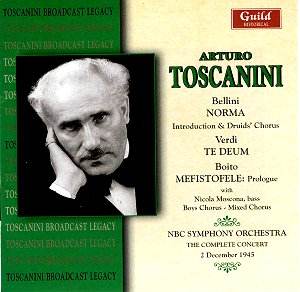It was not unusual
for Toscanini to include vocal or operatic
items in his broadcast programs, but
it was rare for them to be wholly vocal
and without any particular cohesive
theme. He had a distinguished background
in the opera house. He conducted the
premières of both Pagliacci and
La Boheme. His work in the theatre concluded
at Salzburg in 1937 and he only gave
concert performances for NBC (all those
performances were recorded and have
been issued commercially) in New York.
This disc provides a rare opportunity
to hear him in the likes of Bellini.
The accompanying booklet suggests that
Toscanini’s performance of the Norma
‘Prologue’ is utterly different from
other performances ‘by his complete
avoidance of the delicate and lyrical
style most conductors routinely apply
to Bellini’. In comparing Bonynge
(Decca with Sutherland) and Cillario
(RCA with Caballé) that is not
so in respect of tempi or dynamic. Bonynge
reaches Oroveso’s entry in 2 minutes
40 seconds, concluding in 7.49 as against
Toscanini’s 3.00. and 9.18. Maybe, with
his last theatre experience of the work
being nearly fifty years before, he
was luxuriating in the long Bellinian
cantilena (tr. 2). Anyway, the forward
momentum is sufficient for dramatic
cohesion and the male chorus is vibrant
and well articulated. There is no distortion
in the orchestral climaxes although
the overall sound is set at a relatively
low level and is rather ‘boxy’. The
Greek bass, Nicola Moscana as Oroveso
is firm if lacking the sap and weight
of tone to ideally convey the gravity
and implacability of the part.
The ‘Te Deum’ is the
longest of Verdi’s ‘Quattro pezzi sacri’.
Composed between 1889 and 1897 they
form part of the great man’s last compositions.
The work was premiered in Paris in April
1898 and received its Italian première,
under Toscanini’s baton, in Turin, the
following May. The conductor, characteristically
in Verdi, is more thrusting in tempi
than in the Bellini, with a very wide
dynamic on choral climaxes as in the
‘Sanctus’ (tr 4; the parts are not separately
tracked) and there are one or two places
where the sound of the chorus recedes
and loses vibrancy. Perhaps the transcription
sources were not wholly ideal. I don’t
believe there is sufficient distinctive
quality in this performance to give
it preference over the better recorded
1954 version that has been issued by
RCA.
Toscanini had long
championed Boito’s Mefistofele having
conducted productions in Italy and South
America. His tempi here are faster,
distinctly so in Mefistofeles’ aria
‘Ave Signor’ (tr. 8), than de Fabritiis
on Decca’s recording of the complete
opera, but more relaxed in the concluding
‘Salve Regina’ (tr. 9). Whilst being
steady toned, and with exemplary diction,
as in the Bellini, Moscana manages more
tonal colour here. In the thrilling
concluding finale the chorus is a little
overloaded and loses some definition.
As with Verdi’s Te Deum a later, and
better recorded, performance (1954),
has been issued by RCA.
This is an unusual
programme of unrelated items in fair
sound. Even those who have the later
recordings of the Verdi and Boito will
be tempted to hear the great conductor
in Bellini and should not, particularly
at the modest price, hesitate.
Robert J Farr
